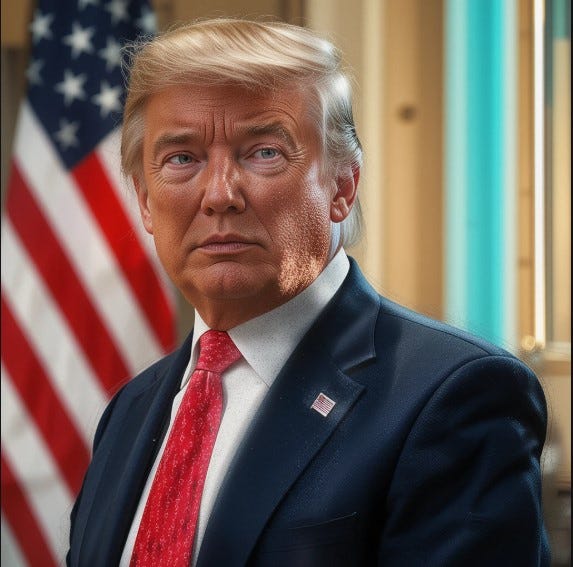In the year 2032, the world’s strongest democracy stood on a familiar but unsettling precipice. The President, Carson Vale, once a television mogul with a flair for spectacle, had transformed the White House into a stage of vengeance, vendetta, and viral dominance. Elected on a populist wave promising to “Cleanse the Corporate Cesspool,” Vale had since turned the Department of Justice into a finely tuned weapon, aimed not at justice, but at submission.
The latest to fall in line was Tridium, the largest data infrastructure firm in the Western Hemisphere, responsible for 40% of the world’s cloud-based logistics systems. Two weeks after Tridium's CEO, Ella Munroe, made a thinly veiled critique of the administration's data localization bill, her company received a federal lawsuit citing "systemic misuse of public information architecture and violations of sovereignty law." The complaint, a Frankensteinian fusion of outdated statutes and AI-generated legalese, was laughable on paper. Every legal analyst, from Harvard to Hacker News, predicted the case would be thrown out within days.
But Tridium settled—for $87 million.
The public roared. The opposition cried foul. Tridium’s lawyers, off-record, admitted they could have crushed the case “with one hand tied to a quantum firewall.” But Ella Munroe had made the call after a brief visit from a man named Julian Ray, the President’s Special Counsel for “Economic Order Restoration.”
Julian Ray was a former hedge fund fixer turned federal enforcer. He came bearing no threats. Just a stack of papers and a warm smile. His message was always the same: “You can spend years fighting. Or spend hours solving. The President believes in solutions.”
Ella, like the other executives before her, chose hours.
It wasn’t just Tridium. In quick succession:
Zintoro Pharma paid $62 million to settle a lawsuit accusing them of "chemical elitism" for selling gene-editing treatments at different prices to different states. The suit cited "emotional inequality" as a public health violation.
Gigasol Energy, the leading solar grid operator, agreed to $49 million in penalties for “improper sun mapping” after the administration claimed their satellite patterns favored coastal regions over the “Heartlands.”
Skirkland & Hodgkins, a law firm agreed to provide $740 million in “pro bono” work. All because they committed the crime of being good at their work when their jobs involved opposing President Carson.
JunoAI, a defense-grade AI firm, forked out $73 million over allegations that their language models “disproportionately trained on anti-national ideologies.”
The kicker? Not one case went to court.
The pattern was too obvious to ignore, but too subtle to indict. Each settlement was voluntary. The President never signed an executive order forcing compliance. No one could prove coercion. Just “litigation fatigue” and “operational discretion.” The DOJ called it “Corporate Social Contribution.” The media labeled it “The Silence Dividend.”
Behind closed doors, corporate leaders whispered what everyone suspected, that these were not lawsuits but modern tributes. Not in gold, but in silence, compliance, and the occasional televised handshake. It was hush money paid to the king of noise.
Celia Park, a young investigative journalist for The Dominion Ledger, had begun to connect the dots after Gigasol’s CFO drunkenly hinted at a “List” at a private equity fundraiser.
“There’s a spreadsheet,” he said. “Every company with reach, revenue, and media influence is ranked. We’re all gonna pay our tithes, one way or another.”
Celia went digging. In a data leak from a dismissed intern at the Economic Order Restoration Office, she found it: The Influence Equilibrium Index, a chilling matrix of companies, color-coded by perceived loyalty to the administration, size of public reach, and vulnerability to regulatory action.
The most damning column was titled: “Suggested Settlement Window.”
Celia’s exposé shook the Capitol for exactly four days, until a deepfake of her appeared on a major network’s primetime feed, edited footage showing her allegedly accepting bribes from a “foreign lobby.” Though the network retracted the clip days later, Celia’s credibility was effectively destroyed. She received zero invites to testify before Congress.
Instead, Congress held a bipartisan hearing to commend the President for reducing federal caseloads by 63%.
Inside the Oval Office, President Carson Vale stared at his collection of framed checks, facsimiles of each corporate settlement, signed by their CEOs and accompanied by public letters of “cooperation.” They were trophies, each more valuable than any military parade or foreign handshake.
He turned to Julian Ray.
“They say we’re bankrupting free enterprise,” the President muttered, lighting a cigar. “You think they’ll fight back?”
Julian adjusted his cuffs. “They won’t. You’ve created a new market: the market of fear. Compliance is cheaper than resistance. Silence is cheaper than dissent.”
Vale chuckled. “The American Dream, pay to play, and pay not to speak.”
But somewhere in the heart of the country, resistance was brewing, not from CEOs or senators, but from shareholders. At Tridium’s annual board meeting, a surprise motion was introduced: to commission a full independent audit of the legal rationale behind the company’s settlement.
Ella Munroe resisted. But the motion passed.
Elsewhere, a group of tech founders, including a libertarian drone billionaire and a crypto-anarchist software mogul, launched The Atlas Collective, a legal defense fund for companies targeted by what they termed “Executive Legal Warfare.”
The first case they planned to fight? A mysterious new DOJ complaint filed against a book publisher who had dared to sign a whistleblower's memoir.
The publisher’s name? Covenant Press.
And just two days before the case went public, a courier arrived at their headquarters carrying a sealed envelope.
Inside: A proposed settlement.
Amount: $5 million.
Terms: Confidential.
The publisher refused.
The war had begun.




